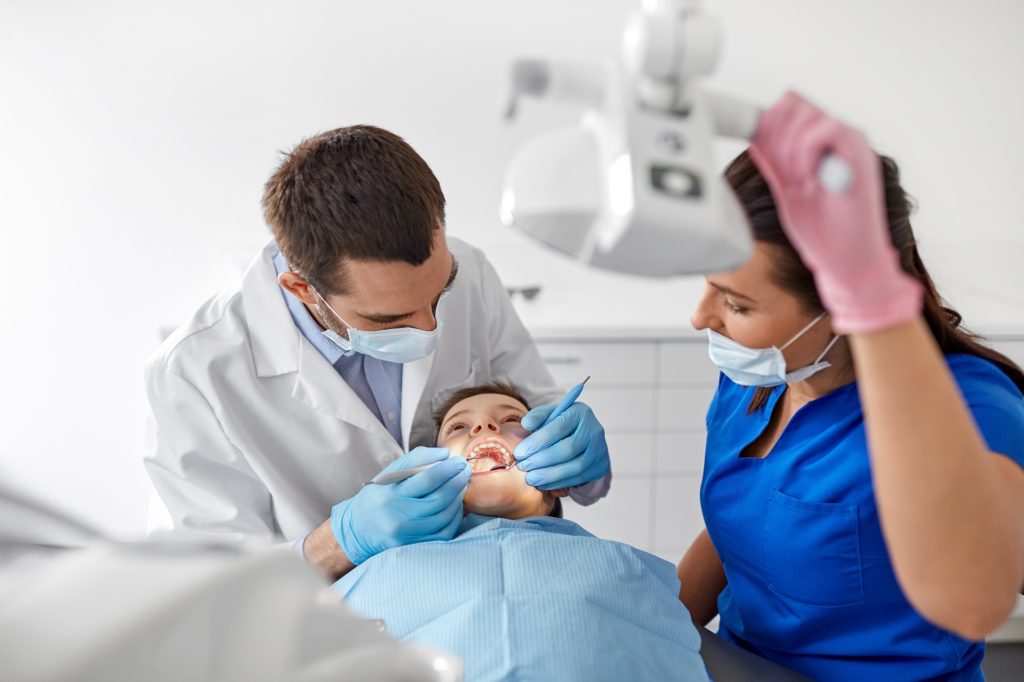
The dentistry field is unique in that it provides critical services that exist within two important categories: health care and personal aesthetics. Offering this level of diversity and scope within a single field requires a coordinated team of highly trained dental health professionals – among which dental assistants serve an essential role.
For those who truly enjoy helping people look and feel better as they maintain a healthful life, becoming a dental assistant can be the first step toward a long and rewarding career in dentistry. Not only is there a growing demand for dental assistants in the U.S., but being trained as a dental assistant can open the door to greater career opportunities within this state-of-the-art healthcare field.
Interested In Our Dental Assistant Program? CLICK HERE >
And, it’s possible to be trained and ready to begin your career as a dental assistant in less than a year’s time.
Before you go out and enroll in a Dental Assistant Training Program at one of our UEI College campuses, however, ask yourself this: is a career as a dental assistant right for you? After all, dental assisting requires a broad set of medical, administrative, technical, and interpersonal skills – skills you will use every day as you work with patients and dentistry staff.
Keep reading, and you’ll learn what it means to be a dental assistant and what it takes to succeed within this essential, past-paced role. So, you may be wondering, what exactly do dental assistants do? This post provides you with all you need to know about what a dental assistant does.
What Does a Dental Assistant Do?
Dental assistants perform a number of functions within a clinic. For example, dental assistants typically help with front office work, such as scheduling appointments and updating patient dental records. Also, dental assistants perform back-office work, such as preparing exam rooms, sterilizing tools and equipment, taking x-rays, and helping dentists with procedures such as fillings, crowns, extractions, root canals, etc. The type of work that dental assistants do depends on the dental clinic they work at and the state where the dental clinic is located.
Overall, the dentistry field is made up of professional roles which focus either on patients or organizational duties in the clinic; dental assistants work at both ends of the spectrum. As key members of a dentistry team, dental assistants exist to help improve the quality and efficiency of a clinic, both administratively at the front of the office and clinically in the examination room.
Interested In Our Dental Assistant Program? CLICK HERE >
So, if you’re considering a career as a dental assistant, you should keep in mind that you should be willing to take on multiple roles, in other words, as they work closely with nearly everyone on a dental clinic staff: dentists, hygienists, office managers, billing professionals, lab staff, and of course patients.
Again, the specific tasks a dental assistant may take on care vary considerably from clinic to clinic. However, here are some of the tasks most dental assistants can expect to perform:
Dental Assistant Administrative Tasks
- Answering phones and scheduling appointments
- Updating and maintaining patient dental records
- Overseeing patient check-in procedures
- Coding and preparing insurance forms
- Scheduling referral and testing appointments
- General office administration
Dental Assistant Clinical Tasks
- Showing patients to their exam rooms
- Preparing patients for procedures and/or surgeries
- Assisting with procedures such as fillings, crowns, and extractions
- Making dental impressions
- Sterilizing dental tools and equipment
- Post-procedure clean-up
- Generally chairside assisting of dentists and hygienists
What Skills Must Dental Assistants Have?
As dental assistants often split time between the front and back of the clinic, they should develop several personal, professional, and technical skillsets that allow them to seamlessly move from task to task while maintaining a high level of focus and attention to detail.
Successful dental assistants, for example, should be as good at communicating with dentists and hygienists as they are at discussing processes, symptoms, and procedures with patients. They should also be trained and skilled in such subjects as dental science, radiography, preventative dentistry, and prosthodontics, to name just a few.
Some skill sets that make a good dental assistant involve innate personal abilities, but many of them can be learned and enhanced. Skills include:
Interpersonal Skills
- Empathy and compassion for people
- Ability to listen, understand, and following directions
- Good communication skills
- Strong attention to detail
- A willingness to learn and grow
Technical Skills
- Knowledge of dental procedures
- Ability to take X-rays, make dental impressions, read blood pressure, etc.
- Capable at spotting possible dental emergencies
- Ability to prepare and sterilize exam room and dentistry tools
- Understanding of common dental materials
Administrative Skills
- Ability to multitask and solve problems
- Organizational skills
- Literacy in computers and applications
- Tracking and ordering necessary supplies
Many of these skills come with training and practice, but they all can be improved and refined with experience in the field. Moreover, each essential skill plays a role in an oral health team’s ability to deliver safe and efficient services within a clinical environment.
Interested In Our Dental Assistant Program? CLICK HERE >
Where do Dental Assistants Work?
Dental assistants usually work in dental clinics, assisting dentists with front office work, such as scheduling appointments and updating patients’ records. Dental assistants work in the back office of dental clinics, assisting dentists with tasks such as performing x-rays and procedures such as root canals, fillings, cleanings, etc. Although the vast majority of dental assistants work at dental clinics, the Bureau of Labor Statistics points out that dental assistants also work in physician offices, governmental offices, colleges, and universities.
What Does a Day in the Life of a Dental Assistant Look Like?
Although no day is the same at a dental clinic, the day of a dental assistant may start with the dental assistant sterilizing and disinfecting medical instruments, preparing exam rooms and dental equipment for patients, and setting up instrument trays for the dentists. Then, when patients begin arriving at the clinic, dental assistants may take down patient information and update their dental records. Afterward, they may assist the dentist by handing the dentist instruments and assisting the dentist with the procedures he or she is performing.
How Does One Become a Dental Assistant?
Perhaps surprisingly, some states do not have set education, training, and licensing requirements for one to become an entry-level dental assistant so long as he or she works under the direct supervision of a licensed dentist. Some states have set special licensing and training requirements for performing certain tasks within the position, such as radiography/X-rays, coronal polishing, and other expanded functions. Visit the Dental Assisting National Board, Inc. website to learn what’s offered and required in your state.
That said, being specifically trained with the knowledge and skills necessary to successfully perform the duties of a dental assistant can help one stand out within a competitive market. Students enrolled in the UEI College Dental Assistant program can complete such training while also earning on-the-job experience at a local clinic in as few as 10 months. Graduates emerge from the program career-ready and prepared to seek further certifications, such as Registered Dental Assistant (RDA), that can further improve their employment potential.
What’s the Job Outlook for a Dental Assistant?
According to the U.S. Bureau of Labor Statistics (BLS), which tracks such work-related statistics, the job outlook for dental assistant positions over the next 10 years is above average. Employment opportunity for dental assistants, they report, is projected to grow by 11% between now and 2030.
That’s about 44,400 job openings for dental assistants, on average, each and every year throughout this projection. Besides the need to replace workers who transfer or retire from the profession, much of this growth is being attributed to recovery from the COVID-19 recession as well as ongoing research that continues to link oral health with one’s general health.
What Does UEI Dental Assistant Training Entail?
The Dental Assistant (DA) program at UEI College focuses on teaching students the most necessary and current skills, tasks, and tools used by dental assistants within today’s modern dentistry clinic.
The program, which can be completed in as few as 10 months provides a mix of classroom instruction, hands-on lab training, and real-world experience that strives to prepare students to be career-ready upon completion of the entire curriculum. And, all classes and labs are taught by instructors with real-world experience in the dental field.
Courses within the program include:
- Dental Sciences / Medical Emergencies
- Chairside Assisting
- Radiography
- Dental Materials
- Preventative Dentistry
- Dental Specialties
- Prosthodontics / Administrative Assistance
The program also includes a 170-hour externship during which students may develop real-world experience in a dental clinic, office, or practice. In its entirety, the UEI College Dental Assistant program prepares students for entry-level positions with titles like dental assistant, orthodontic assistant, oral surgery assistant, orthodontic technician, surgical, dental assistant, and registered dental assistant.
Interested In Our Dental Assistant Program? CLICK HERE >
To learn more about the UEI College Dental Assistant program, please visit the Dental Assistant Program page. You may also contact us directly at (877) 463-4472 or through our online form.





